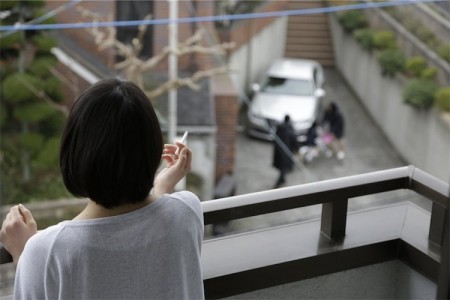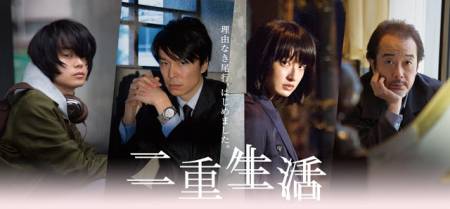-
DOUBLE LIFE (Yoshiyuki Kishi 2016)
YOSHIYUKI KISHI: DOUBLE LIFE (2016)

MUGI KADOWAKI IN DOUBLE LIFE
Spying on life to try to understand it
Double Life, though it traces back to a French novel, is very much a contemporary Japanese film. It contrasts with the NYAFF Main Competition films from other countries, the violence and political commentary of the films from Hong Kong and the Philippines, the energy and moral concerns of the Film from Thailand. Here the people are comfortable, and often cute. They live in surroundings that are attractive and clean. But nobody quite knows what life's all about, and suicide is a distinct possibility for some. This is a world of angst and anomie Michelangelo Antonioni would understand. In one of his films, the role of Tama would be played by Monica Vitti. There is a fleeting resemblance. With the distancing and reveals there are hints of Michael Haneke too.
Tama (Mugi Kadowaki), a philosophy graduate student ("What Is Existence in Contemporary Japan," is her Master's thesis title), wakes up in a bedroom steeped in blue and gray next to a boyfriend, Takuya (Masaki Suda), as beautiful as a woman (he's a game designer busy making soft porny girly pictures). They make love using Sagami Original 0.01 thinner-than-ever Japanese condoms. Then she gets up and smokes a cigarette on her balcony and watches her neighbor, Ishizaka (Hiroki Hasegawa), a successful book editor who seems like the perfect family man, down below with his wife, playing with his little girl.
Soon Tama's budding voyeuristic obsession gets her inextricably tangled in other people’s secret lives. Her following one person is a suggestion of her philosophy dissertation supervisor Professor Shinohara (the very busy actor Lily Franky), who views her idea of surveying 100 people more the methodology of sociology or psychology. The professor has a book on his desk by Sophie Calle, a French author who has incorporated real life stories of tailing or shadowing people into her work. (Her book True Stories was an inspiration for the novel by Mariko Koike on which this film is based.)
Tama immediately begins following Ishizaka closely and sees him making it in an alleyway with another woman, whom she also in turn follows: his mistress, she learns, is "Shawamura Shinobu, Bookbinder": her picture and title come up on her smart phone. Tama has become a detective - and is having fun, becoming so zealous everything else in her life, her boyfriend and social life, falls by the wayside. She doesn't really know what she's doing, and she leaves a mess as well as observes a mess.
When a nosy, or more likely turned on, department associate (Shôhei Uno) questions her about her thesis at a departmental drinking party, Tama's understandably reluctant to explain. It is, after all, not only irregular but arguably nutty, what she's doing. And she doesn't tell Takuya, and must not have contact with the man she's tailing, the professor tells her.
But that doesn't work - and leads away from the long, subtle, observational passages without dialogue to a central sequence when Tama explains herself far too much and appears so naive and weepy it's a turnoff, though, paradoxically, it follows the film's second intensely erotic passage. When Tama's identity is "blown," that closes Ishizaka, her "Subject A," off as a subject, but she has also been tailing her professor, who is "Subject B," and now occupies the foreground of her study.
In a flurry of intense activity, Tama finishes her thesis (it's not very long), alienating Tacuya perhaps terminally in the process. Meanwhile the professor attends his dying mother with what is apparently his wife. Before Tama submits the final version of her thesis, which Professor Shinohara ultimately rates a 93, he gives her an address and a theater ticket that lead her (and us) to discover something about him she couldn't have known - people you tail aren't always who they seem - while throwing in some jokey existential references to hHamlet for good measure.
I don't know where contemporary philosophy has been going, but all this seems a bloody awful topic and methodology for a philosophy thesis. But it winds up seeming not a bad idea for a movie - one that mixes detective fiction with domestic drama while reminding us that in watching a movie, we too, like Tama, are basically voyeurs, maybe also, like her, trying in our fumbling ways to figure out the meaning of contemporary existence.
A parallel counterpoint to the main story of Tama's voyeuristic obsession and her professor's problematic behavior is provided by an older female inhabitant of Tama's and her boyfriend's apartment building, Setsuko Karasuma, who installs a CCTV surveillance camera out back to find who's making such a mess of the common garbage/recycling area. It's a not a very subtle Haneke-esque device, but this lady is one of the ways the plot lines can be intertwined. So the camera is spying on everybody with its cold fish eye and black and white imagery while Tama's spying more selectively, but in color and with all her heart.
Double Life is a little more complicated than it needs to be, winding up feeling longer than it ought to, but it's also full of ideas and quite ingenious, a worthy product of an over sophisticated culture. The film is original and has depth and complexity; the director shows promise and so does his lead. All three male leads are good, Suda, Franky, and Hasegawa, the latter particularly surprising as the duplicitous, manipulative, and, up close, dangerously boyish "Subject A," who can't be trusted as a husband, an editor, a lover, or even a man to tail.
Double Life/ 二重生活/Nijû seikatsu, 126 mins., debuted in Japan 25 Jun 2016. It is based on the novel Nijyuu Seikatsu by Mariko Koike (published 28 Jun. 2012 by Kadokawa Shoten. Dp Kozo Natsumi. It is Kishi's directorial debut and Mugi Kadowaki's first lead performance in a movie. Reviewed as part of the NYAFF where it was shown at Lincoln Center 3 Jul. 2017. It is the Japan entry in the festival's seven-film Main Competition.

Last edited by Chris Knipp; 07-04-2017 at 01:00 PM.
 Posting Permissions
Posting Permissions
- You may not post new threads
- You may not post replies
- You may not post attachments
- You may not edit your posts
-
Forum Rules






 Reply With Quote
Reply With Quote
Bookmarks